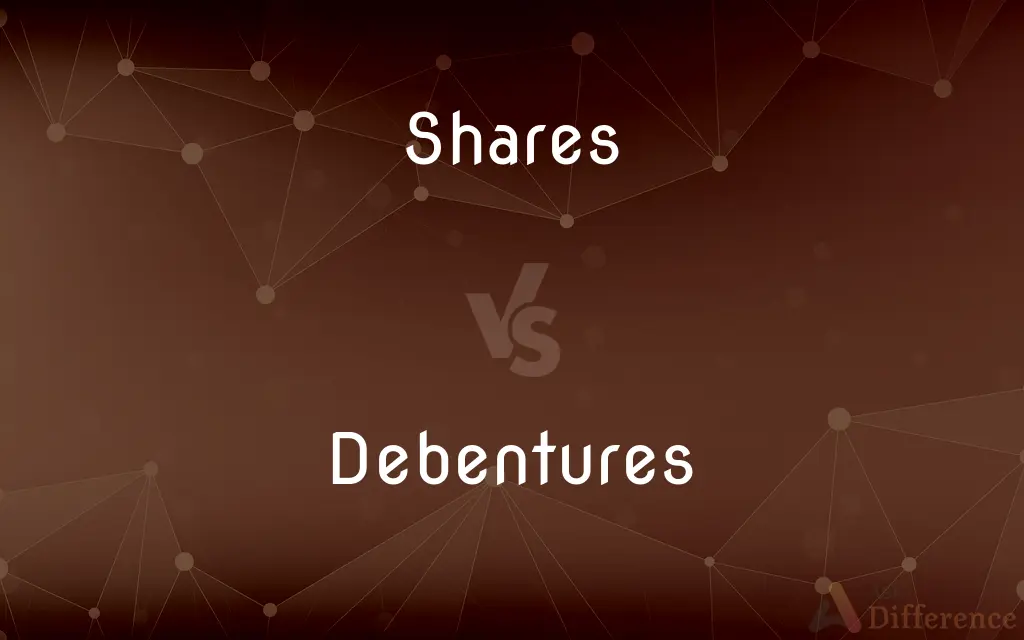Shares vs. Debentures — What's the Difference?
Edited by Tayyaba Rehman — By Fiza Rafique — Published on December 22, 2023
Shares represent ownership in a company, offering a claim on profits. Debentures are company-issued debt instruments, promising to repay with interest.

Difference Between Shares and Debentures
Table of Contents
ADVERTISEMENT
Key Differences
Shares and Debentures are both financial instruments companies use, but they serve different purposes. Shares represent a portion of ownership in a company, granting the shareholder a claim on a portion of the company's profits. Conversely, Debentures signify a company's debt, where the company promises to repay the principal amount along with interest.
When an investor buys Shares, they become a part-owner of the company. This ownership stake means they may receive dividends, which are portions of the company's profit. In contrast, when an investor purchases Debentures, they become a creditor to the company. The company owes them the debt amount and must pay interest on this borrowed sum.
Shares usually come with voting rights in the company, allowing shareholders to influence company decisions. These rights are proportional to the number of Shares held. Debentures, being debt instruments, don't grant any ownership or voting rights. However, Debenture holders have a higher claim on company assets in case of liquidation compared to shareholders.
The returns on Shares, known as dividends, are not guaranteed and depend on the company's profitability. In contrast, Debentures offer fixed returns in the form of interest payments, regardless of the company's profit or loss.
In summary, while Shares and Debentures both provide investment avenues, they differ in terms of rights, returns, and risks. Shares offer potential higher rewards with higher risks, while Debentures offer fixed returns with the security of repayment.
ADVERTISEMENT
Comparison Chart
Nature
Ownership
Debt
Returns
Dividends (not guaranteed)
Interest (fixed)
Rights
Voting rights
No voting rights
Claim in Liquidation
After debenture holders and other creditors
Before shareholders
Risk
Higher (depends on company performance)
Lower (fixed interest payments)
Compare with Definitions
Shares
Units representing equity capital.
The company issued new Shares to raise funds.
Debentures
Fixed-interest-bearing securities repayable at a specified date.
Investors prefer Debentures for stable returns.
Shares
Financial instruments offering a stake in a company's assets and earnings.
Her portfolio consists mostly of blue-chip Shares.
Debentures
Bonds evidencing debt without collateral.
Without any assets backing them, some Debentures can be riskier.
Shares
Equity securities that signify proportionate ownership.
Acquiring more Shares increases one's influence in company decisions.
Debentures
Financial instruments signaling company debt with a promise to repay.
He invested a portion of his savings in corporate Debentures.
Shares
Certificates reflecting a shareholder's interest in a company.
He sold his Shares when the market peaked.
Debentures
Long-term debt instruments issued by companies.
The firm plans to raise capital by issuing Debentures.
Shares
A part or portion belonging to, distributed to, contributed by, or owed by a person or group
The pirates argued over their shares of the treasure.
Debentures
Unsecured loans taken by companies through public issuance.
The company's Debentures were oversubscribed within hours.
Shares
An equitable portion
Do one's share of the work.
Debentures
A certificate or voucher acknowledging a debt.
Shares
One of the equal parts into which the capital stock of a company is divided
Bought 200 shares of the company's stock.
Debentures
An unsecured bond issued by a civil or governmental corporation or agency and backed only by the credit standing of the issuer.
Shares
A unit of ownership in a mutual fund or other investment vehicle
Bought two shares in a mutual fund.
Debentures
A customhouse certificate providing for the payment of a drawback.
Shares
Shares Chiefly British Stocks
European shares jumped two percent. The fund invests half the money in bonds and half in shares.
Debentures
Plural of debenture
Shares
A plowshare.
Shares
To accord a share in (something) to another or others
Shared her chocolate bar with a friend.
Shares
To divide and parcel out in shares; apportion
Shared the estate among his heirs.
Shares
To participate in, use, enjoy, or experience jointly or in turns
Share a responsibility.
Share a room.
Shares
To hold or have jointly with another or others
She shares my view about the election.
Shares
To relate (a secret or experience, for example) to another or others.
Shares
(Computers) To make (a digital file) accessible to other users on a network, as for copying and downloading.
Shares
To have a share or part
Shared in the profits.
Shares
To allow someone to use or enjoy something that one possesses
Being in daycare taught the child to share.
Shares
To use or enjoy something jointly or in turns
There is only one computer, so we will have to share.
Shares
To talk about personal experiences or feelings with others.
Shares
Plural of share
Shares
Portions of ownership in a company.
He bought 100 Shares of the tech company.
Common Curiosities
Do Shares guarantee returns?
No, returns on Shares (dividends) depend on company profitability.
What do Debentures represent?
Debentures are debt instruments where companies promise to repay with interest.
Are Debenture returns fixed?
Yes, Debentures offer fixed interest payments.
Do Debenture holders get voting rights?
No, Debentures don't grant any voting or ownership rights.
What are Shares?
Shares represent ownership in a company, giving a claim on its profits.
What happens to Debentures at maturity?
Companies repay the principal amount to Debenture holders.
Can shareholders influence company decisions?
Yes, shareholders usually have voting rights proportional to their Shares.
Do all shareholders receive dividends?
If a company declares dividends, they are usually distributed to all shareholders.
Which is riskier, Shares or Debentures?
Shares generally carry higher risk but also potential higher rewards.
How often do companies pay interest on Debentures?
Typically, interest is paid annually or semi-annually.
Can a company issue both Shares and Debentures?
Absolutely, companies can use both to raise capital.
Which has a higher claim in case of liquidation?
Debenture holders have a priority claim over shareholders.
Are all Debentures unsecured?
No, while some Debentures are unsecured, others might have assets as collateral.
Can Shares be sold in the stock market?
Yes, Shares of publicly traded companies can be bought and sold in stock exchanges.
How do companies decide the interest rate for Debentures?
Interest rates depend on market conditions, company creditworthiness, and the duration of the Debenture.
Share Your Discovery

Previous Comparison
Shrubs vs. Trees
Next Comparison
ANSI vs. UnicodeAuthor Spotlight
Written by
Fiza RafiqueFiza Rafique is a skilled content writer at AskDifference.com, where she meticulously refines and enhances written pieces. Drawing from her vast editorial expertise, Fiza ensures clarity, accuracy, and precision in every article. Passionate about language, she continually seeks to elevate the quality of content for readers worldwide.
Edited by
Tayyaba RehmanTayyaba Rehman is a distinguished writer, currently serving as a primary contributor to askdifference.com. As a researcher in semantics and etymology, Tayyaba's passion for the complexity of languages and their distinctions has found a perfect home on the platform. Tayyaba delves into the intricacies of language, distinguishing between commonly confused words and phrases, thereby providing clarity for readers worldwide.













































